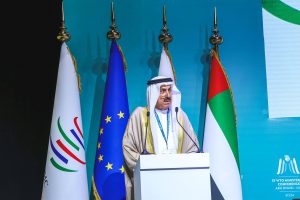ABU DHABI/ WAM
Saqr Ghobash, Speaker of the Federal National Council (FNC), inaugurated the Abu Dhabi Session of the Parliamentary Conference on the World Trade Organisation (PCWTO) today at the Abu Dhabi National Exhibition Centre (ADNEC).
The conference was organised by the FNC in cooperation with the Inter-Parliamentary Union (IPU) and the European Parliament (EP), in the presence of Dr. Thani bin Ahmed Al Zeyoudi, Minister of State for Foreign Trade, and Chairman of the 13th WTO Ministerial Conference (MC13), as well as a number of ministers and nearly 300 parliamentarians.
In his opening speech, Saqr Ghobash affirmed that any issues agreed on during the PCWTO’s Abu Dhabi Session will make a difference in the lives of people around the world. He added that implementing such agreements promotes hope globally that world nations are capable of going beyond geopolitical barriers to make a tangible impact and facilitate international trade, as well as find practical solutions to ongoing shifts, especially those related to the exchange of information and data, and the easy movement of goods between global markets, further advancing arrival of the age of open trade.
Likening the WTO’s MC13 to COP28, Ghobash expressed his conviction that MC13 will build extensively on the outcomes and recommendations of the ‘Geneva Package’, the package of agreements secured during the 12th WTO Ministerial Conference, including those on pandemic preparedness, intellectual property rights, and exempting food from export restrictions.
He noted that this conviction is backed by the efforts of the UAE and other countries to ensure that this conference makes a difference in setting the WTO’s path forward, especially in terms of promoting a multilateral trade system and practical solutions to current challenges, such as the exchange of information and challenges that impede global trade.
Ghobash affirmed that governments and competent authorities must align their efforts to enact legislation that sets clear and ambitious goals to be implemented within a reasonable time frame to drive investment in sustainable development projects and deal with protectionist trade measures that hinder the trade activities of developing countries.
In his speech, Dr. Al Zeyoudi said, “The past few years have proven the importance and the central role of trade in ensuring the recovery and resilience of the global economy, and at the same time highlighted the implications of low-resilience global supply chains. The free flow of goods and services and the systems that support it should always be a priority for parliaments and political leaders around the world. This conference is an important forum to ensure that legislators are aware of the issues facing global trade and ways to deal with them.”
He welcomed the final statement of the WTO Parliamentary Conference and reiterated the importance of promoting a multilateral global trade system.
For his part, Martin Chungong, Secretary-General of the Inter-Parliamentary Union (IPU), highlighted the global drive to align efforts to promote global trade for the benefit of all countries and peoples.
He commended the UAE’s efforts and facilities to ensure the success of MC13, lauding its excellence in organising international conferences and summits, and following up on the implementation of resulting agreements. He also stressed the importance of cooperation between parliaments and governments to enhance international trade systems, highlighting the key role of the IPU and national parliaments in supporting the WTO’s work and efforts to implement international agreements.
Bernd Lange, Chair of the European Parliament’s Committee on International Trade and PCWTO Co-Chair, highlighted the importance of parliamentarians’ participation in the PCWTO and MC13 to discuss the most pressing issues related to the future of trade.
He explained that parliamentarians play a fundamental role in cooperation with governments, as it is their responsibility to respond to and achieve the aspirations and expectations of the people.
We live in a world full of political crises, geographical and political issues, and environmental hazards, Lange said, adding that countries of the world must unite around facing these challenges and support the multilateral trade system.
Ngozi Okonjo-Iweala, Director-General of the World Trade Organisation, affirmed that the WTO places special focus on people-centric efforts, noting that trade should be utilised to create jobs and improve people’s lives and livelihoods.
She urged parliamentary institutions to prioritise supporting the WTO in resolving many challenges such as the cost of living and poverty.
The WTO Director-General added that the goals of the WTO are aligned with the drive to find solutions to global challenges, noting that parliamentarians are the link between the WTO and the people. She asserted that, through parliaments, agreements become national legislation and international decisions.
She said that, in addition to implementing the WTO Agreement on Fisheries Subsidies, MC13 will see part two of the agreement on the fisheries subsidies come to life, besides providing an opportunity to reach reforms on agriculture.
Okonjo-Iweala highlighted the essential role that digital economies play in creating jobs around the world, noting that partnerships are also helping improve global trade, by aiding in the enforcement of dispute settlement decisions.
She pointed out that several developing countries have committed to joining the WTO, and there are 22 countries in the queue wanting to become members.
The Abu Dhabi Session of the PCWTO was organised by the FNC in partnership with the Inter-Parliamentary Union (IPU) and the European Parliament (EP), and saw the attendance of a number of ministers and nearly 300 parliamentarians.
 The Gulf Time Newspaper One of the finest business newspapers in the UAE brought to you by our professional writers and editors.
The Gulf Time Newspaper One of the finest business newspapers in the UAE brought to you by our professional writers and editors.
